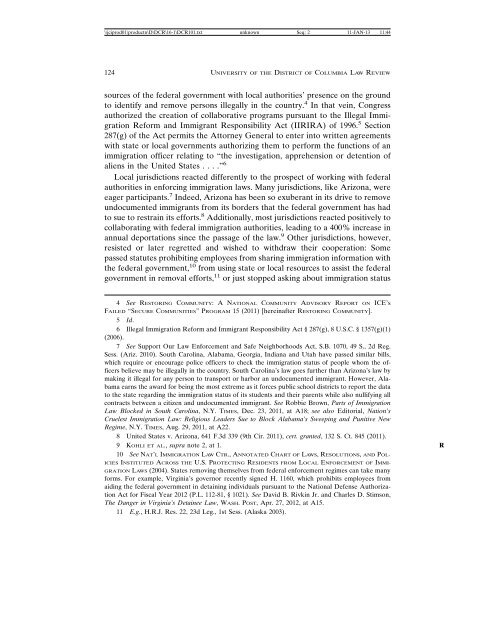threading the needle: constitutional ways for ... - UDC Law Review
threading the needle: constitutional ways for ... - UDC Law Review
threading the needle: constitutional ways for ... - UDC Law Review
You also want an ePaper? Increase the reach of your titles
YUMPU automatically turns print PDFs into web optimized ePapers that Google loves.
\\jciprod01\productn\D\DCR\16-1\DCR101.txt unknown Seq: 2 11-JAN-13 11:44<br />
124 UNIVERSITY OF THE DISTRICT OF COLUMBIA LAW REVIEW<br />
sources of <strong>the</strong> federal government with local authorities’ presence on <strong>the</strong> ground<br />
to identify and remove persons illegally in <strong>the</strong> country. 4 In that vein, Congress<br />
authorized <strong>the</strong> creation of collaborative programs pursuant to <strong>the</strong> Illegal Immigration<br />
Re<strong>for</strong>m and Immigrant Responsibility Act (IIRIRA) of 1996. 5 Section<br />
287(g) of <strong>the</strong> Act permits <strong>the</strong> Attorney General to enter into written agreements<br />
with state or local governments authorizing <strong>the</strong>m to per<strong>for</strong>m <strong>the</strong> functions of an<br />
immigration officer relating to “<strong>the</strong> investigation, apprehension or detention of<br />
aliens in <strong>the</strong> United States . . . .” 6<br />
Local jurisdictions reacted differently to <strong>the</strong> prospect of working with federal<br />
authorities in en<strong>for</strong>cing immigration laws. Many jurisdictions, like Arizona, were<br />
eager participants. 7 Indeed, Arizona has been so exuberant in its drive to remove<br />
undocumented immigrants from its borders that <strong>the</strong> federal government has had<br />
to sue to restrain its ef<strong>for</strong>ts. 8 Additionally, most jurisdictions reacted positively to<br />
collaborating with federal immigration authorities, leading to a 400% increase in<br />
annual deportations since <strong>the</strong> passage of <strong>the</strong> law. 9 O<strong>the</strong>r jurisdictions, however,<br />
resisted or later regretted and wished to withdraw <strong>the</strong>ir cooperation: Some<br />
passed statutes prohibiting employees from sharing immigration in<strong>for</strong>mation with<br />
<strong>the</strong> federal government, 10 from using state or local resources to assist <strong>the</strong> federal<br />
government in removal ef<strong>for</strong>ts, 11 or just stopped asking about immigration status<br />
4 See RESTORING COMMUNITY: A NATIONAL COMMUNITY ADVISORY REPORT ON ICE’S<br />
FAILED “SECURE COMMUNITIES” PROGRAM 15 (2011) [hereinafter RESTORING COMMUNITY].<br />
5 Id.<br />
6 Illegal Immigration Re<strong>for</strong>m and Immigrant Responsibility Act § 287(g), 8 U.S.C. § 1357(g)(1)<br />
(2006).<br />
7 See Support Our <strong>Law</strong> En<strong>for</strong>cement and Safe Neighborhoods Act, S.B. 1070, 49 S., 2d Reg.<br />
Sess. (Ariz. 2010). South Carolina, Alabama, Georgia, Indiana and Utah have passed similar bills,<br />
which require or encourage police officers to check <strong>the</strong> immigration status of people whom <strong>the</strong> officers<br />
believe may be illegally in <strong>the</strong> country. South Carolina’s law goes fur<strong>the</strong>r than Arizona’s law by<br />
making it illegal <strong>for</strong> any person to transport or harbor an undocumented immigrant. However, Alabama<br />
earns <strong>the</strong> award <strong>for</strong> being <strong>the</strong> most extreme as it <strong>for</strong>ces public school districts to report <strong>the</strong> data<br />
to <strong>the</strong> state regarding <strong>the</strong> immigration status of its students and <strong>the</strong>ir parents while also nullifying all<br />
contracts between a citizen and undocumented immigrant. See Robbie Brown, Parts of Immigration<br />
<strong>Law</strong> Blocked in South Carolina, N.Y. TIMES, Dec. 23, 2011, at A18; see also Editorial, Nation’s<br />
Cruelest Immigration <strong>Law</strong>: Religious Leaders Sue to Block Alabama’s Sweeping and Punitive New<br />
Regime, N.Y. TIMES, Aug. 29, 2011, at A22.<br />
8 United States v. Arizona, 641 F.3d 339 (9th Cir. 2011), cert. granted, 132 S. Ct. 845 (2011).<br />
9 KOHLI ET AL., supra note 2, at 1. R<br />
10 See NAT’L IMMIGRATION LAW CTR., ANNOTATED CHART OF LAWS, RESOLUTIONS, AND POL-<br />
ICIES INSTITUTED ACROSS THE U.S. PROTECTING RESIDENTS FROM LOCAL ENFORCEMENT OF IMMI-<br />
GRATION LAWS (2004). States removing <strong>the</strong>mselves from federal en<strong>for</strong>cement regimes can take many<br />
<strong>for</strong>ms. For example, Virginia’s governor recently signed H. 1160, which prohibits employees from<br />
aiding <strong>the</strong> federal government in detaining individuals pursuant to <strong>the</strong> National Defense Authorization<br />
Act <strong>for</strong> Fiscal Year 2012 (P.L. 112-81, § 1021). See David B. Rivkin Jr. and Charles D. Stimson,<br />
The Danger in Virginia’s Detainee <strong>Law</strong>, WASH. POST, Apr. 27, 2012, at A15.<br />
11 E.g., H.R.J. Res. 22, 23d Leg., 1st Sess. (Alaska 2003).














